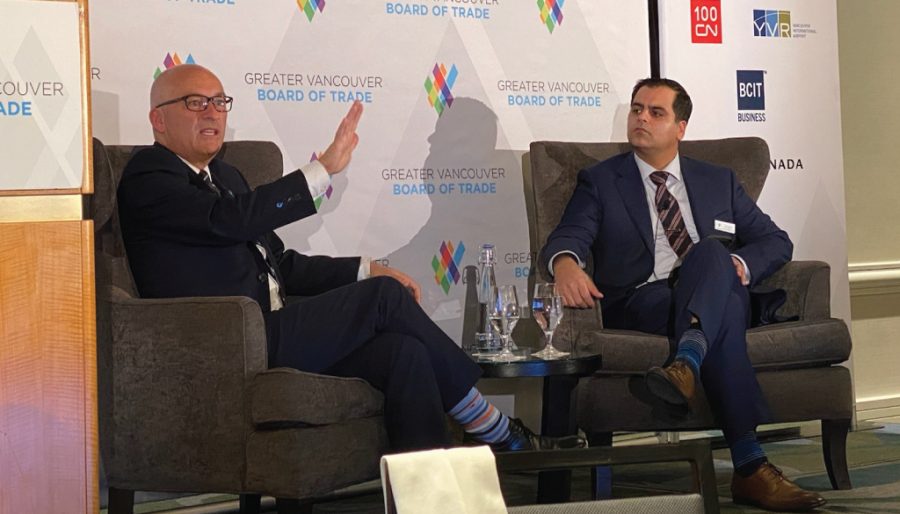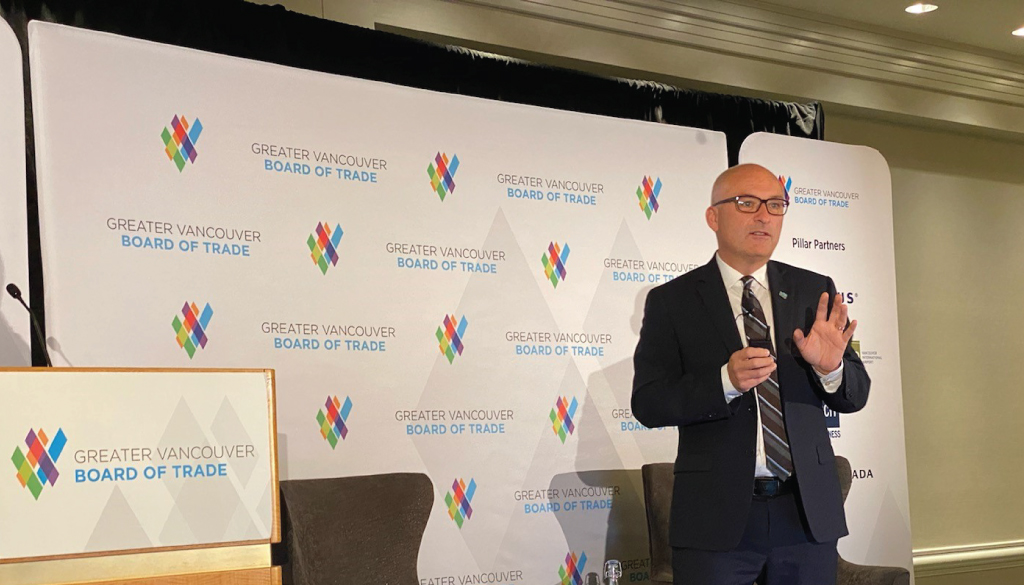In the Mackenzie Ballroom of the Fairmont Waterfront on Tuesday, BC Care Providers Association CEO Daniel Fontaine delivered a keynote address that was, in equal parts, sobering and optimistic.
With more people over the age of 65 than under 15, Canada is on the brink of a major demographic shift that will alter its economic, social and political landscape.

Through his presentation to the Greater Vancouver Board of Trade, Fontaine sought to answer these burning questions:
- how can organizations deal with a rapidly aging workforce, and
- how can they accommodate the needs of workers who serving as caregivers for aging relatives?
He began by stating three simple facts: aging is inevitable; it is impacting businesses; and without implementing appropriate programs, policies and procedures, organizations will fail to keep up with the challenges it triggers.
Fontaine presented to the audience—made up of business leaders, seniors’ care providers and non-profits organizations—several statistics that show how ill-equipped we as a society are to face the rising tide of an aging population.
- B.C. requires an additional 31,000 new long-term care beds by 2035 to meet future demand. B.C. is current short by 3,000 beds.
- Over the last three years, the Province of B.C. has only announced 187 net new long-term care beds.
- Over 8 million Canadians provide informal care to a family member or friend per year.
- 6 million caregivers take time off work to provide care.
- 44% of caregivers between the ages of 45-64 care for both a parent and children.
- Caregivers who look after seniors save Canada’s health care system between $24 to $31 billion annually.
Compelling address by @BCCareProviders / Daniel Fontaine on changing demographics & how busi should adapt, the future of care and the challenge of work force shortages. pic.twitter.com/aYtIqhksux
— David van Hemmen (@davidvanhemmen) November 26, 2019
Using the seniors’ care sector as a model, Fontaine addressed issues such as staffing shortages, unaffordable tuition and training costs, workers aging out of the system, and employment barriers for out-of-province workers and new immigrants.
But the future, Fontaine says, is not “doom and gloom.” Through effective advocacy, strong partnerships, and bold action by government, industry and individuals, we can fill gaps in the system. Fontaine cited the B.C. government’s recent reforms to the Care Aide Registry as an example of such action.
Fascinating speech on our aging society & seniors care – big challenges here already now, not in future, by Daniel Fontaine of @BCCareProviders at #GVBOT #BCPoli #Vanpoli @MikeKlassen pic.twitter.com/ze4UM2FjWG
— BillTieleman (@BillTieleman) November 26, 2019
Few organizations are prepared to deal with the demands of the “sandwich generation” who will increasingly need time off work to care for both young children and aging parents.
In his speech, Fontaine highlighted the emergence of innovative and progressive companies, offering as part of their extended benefits package, urgent “home care” for elderly family members.
Starbucks, for instance, offers its 180,000 U.S. workers 10 subsidized backup care days a year for children and adults. The coffee giant partnered with Care.com to launch Care@Work, an online service connecting families and caregivers.
Starbucks employees can also access resources to help with seniors’ care planning free of cost. They can connect with a seniors’ care advisor for professional guidance in areas such as long-term caregiver options, housing alternatives, finances, and legal concerns.
@BCCareProviders CEO speaks at a @BoardofTrade event on how employers can prepare for supporting workforce that increasingly needs to take responsibility for care of their aging relatives. pic.twitter.com/gAoSuW2gRt
— Olga Stachova (@OlgaStachova) November 26, 2019
Fontaine ended his speech with four recommendations that can help employers prepare for an aging population:
- Revamp your benefits package by offering access to “urgent” home care services for an immediate family member;
- Publicly demand that seniors’ care should be a core part of the discussion during an election or when the need for an economic development strategy is discussed;
- Acknowledge that Freedom 55 is something for the history books, and Freedom 65. Develop strategies, policies and programs to welcome and celebrate experienced workers, many of whom want to work through to 75 or beyond either out of necessity or by choice;
- Set up and provide matching funds for staff to purchase long-term care insurance.
Daniel Fontaine’s presentation is available for download here.





